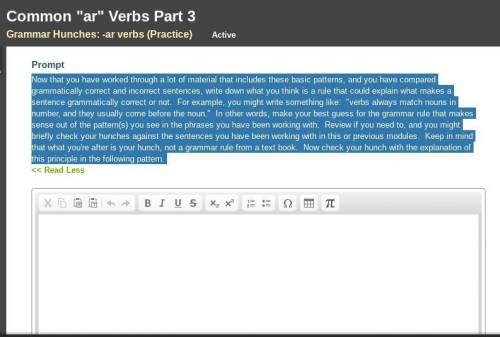
Spanish, 17.11.2020 21:10 Thomas7785
Now that you have worked through a lot of material that includes these basic patterns, and you have compared grammatically correct and incorrect sentences, write down what you think is a rule that could explain what makes a sentence grammatically correct or not. For example, you might write something like: "verbs always match nouns in number, and they usually come before the noun." In other words, make your best guess for the grammar rule that makes sense out of the pattern(s) you see in the phrases you have been working with. Review if you need to, and you might briefly check your hunches against the sentences you have been working with in this or previous modules. Keep in mind that what you're after is your hunch, not a grammar rule from a text book. Now check your hunch with the explanation of this principle in the following pattern. It is on "ar verbs"


Answers: 3


Other questions on the subject: Spanish

Spanish, 21.06.2019 23:30, tireekkimble5
Choose the best spanish equivalent to the phrase. they know the old salesman. conocen al vendedor viejo. saben al vendedor viejo.
Answers: 1

Spanish, 22.06.2019 14:30, orlando19882000
My spanish teacher said to make these sentences into "ar" verb conjugations. can someone plz me with that? 1. ellos están en la computadora 2. la chicas están estudia 3. la chicas están hablamos 4. el ojo de el señor es marrón 5. la muchacha es feliz 6. la muchacha cantar
Answers: 1

Spanish, 22.06.2019 22:40, lberman2005p77lfi
"the crab that played with the sea" which details best support the conclusion that the narrator is speaking directly to a child
Answers: 1

Spanish, 23.06.2019 06:30, lolz55678
(tampoco, nadie, no, nunca, nada, ni, ningún)alguien se ducha. se ducha. se ducha van también. ellas van. ellas van se pone nervioso. se pone nervioso. se pone nervioso ú siempre te lavas las manos. tú te lavas las manos. tú te lavas las manos a traer algo. voy a traer se afeita también. juan se afeita. juan se afeita amigos viven en una residencia o en casa. mis amigos viven en una residencia en casa. la profesora hace algo en su escritorio. la profesora hace en su escritorio. tú y yo vamos al mercado. tú yo vamos al mercado. tienen un espejo en su casa. tienen espejo en su casa.
Answers: 1
You know the right answer?
Now that you have worked through a lot of material that includes these basic patterns, and you have...
Questions in other subjects:

Geography, 01.11.2020 03:30


Mathematics, 01.11.2020 03:30


Mathematics, 01.11.2020 03:30





Mathematics, 01.11.2020 03:30



